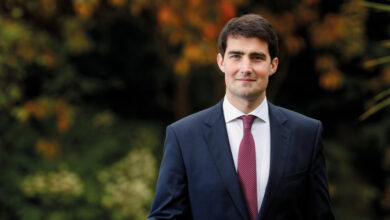The future of Ireland’s water
Water provision is undergoing radical reform in order to conserve it, improve its quality and cut delivery costs. eolas reports.
“Our current model of water provision, where unlimited quantities of an expensive product are provided at no charge, is simply not sustainable,” the Department of the Environment, Community and Local Government’s consultation document states.
A six-week consultation on the creation of new state-owned water company Irish Water, and the implementation of water meters to charge for water use, ends on 24 February.
Irish Water is to take over the water investment and maintenance programmes of the 34 county and city councils. It will be the single point of contact for the 1,093,189 customers connected to the public mains supply and will be statutorily responsible for investing in and operating water services infrastructure. It will provide drinking water and waste water services to household, commercial and industrial customers in Ireland (apart from those served by group water schemes.) It will be regulated by the Commission for Energy Regulation (taking an economic perspective) and the Environmental Protection Agency (taking an environmental perspective).
Water authority
Irish Water will be responsible for:
• ensuring a specific focus on fixing the leaking water network (currently 41 per cent of water is leaked compared to 20 per cent in the UK);
• attracting foreign direct investment for water and sewerage services and infrastructure;
• the abstraction, treatment and distribution of drinking water;
• the collection and treatment of waste water and disposal of sludge;
• customer billing and relationship management;
• supporting the implementation of river basin management plans; and
• rolling out the water metering programme.
Installation of water meters will begin this year and, by 2014, Environment Minister Phil Hogan wants householders to be charged by volume once they go above an initial daily usage (possibly 140 litres). This will encourage water conservation and improve the public’s attitude to water, the department believes.
On speculation that a flat fee will be introduced before 2014, the consultation paper indicates that this is not an option. It states: “There has been criticism from some commentators about the timing of a large scale investment programme of this nature when charges could be introduced either by way of a simple flat rate water charge. The Government believes the installation of water meters represents a long term investment in how we, as a society, manage and fund our water resources.”
In 2010, water services cost €1.2 billion to run, with operational costs at €715 million and capital projects costing €500 million. An independent assessment carried out by PwC concluded that future state investment in water will have to be €600 million annually. This is not possible given the current economic climate (€371 million is being provided for capital expenditure in 2012). The consultation recommends that Irish Water, as a regulated body, would be able to access third-party funding from water charges and from ownership of the assets transferred from local authorities. While government funding would remain in place for a number of years, Irish Water will ultimately be expected to be a self-financing public utility.
An investigation on water provision was carried out by the Joint Oireachtas Committee on Environment, Transport, Culture and the Gaeltacht between September and January.
Frank Convery, who chairs UCD’s Earth Institute and the Irish Fiscal Policy Research Centre, told the committee that Irish Water should recognise the managers of group water schemes. Despite their struggle to bring water quality to the required standards, they charge for water, and “engender a real sense of ownership and commitment by their customers who are also the joint owners of the schemes.”
He was surprised that the debate surrounding the inspection of septic tanks had not discussed the health benefits of such inspections.
Convery outlined the risks of E. coli and trihalomethanes and said: “If my system is beginning to pond, it poses a direct health threat to my family, especially young children, and to the elderly. If leaks occur into groundwater or into ditches and streams, it will damage my neighbours and my community.” He pointed out that if the contamination reaches the whole region, there is less likelihood of investment. “Why should anyone invest in areas where water quality is being allowed to degrade?” he asked.
Water meters
National Consumer Agency Chief Executive Ann Fitzgerald said that the agency recognises the commitment made to the EU-IMF to introduce water charging. However, a flat fee would be “inequitable” and must be replaced by metered system, “otherwise, consumers will view the new charge as just another raw revenue raising measure.”
It pointed to Scottish Water as an “admirable example” of using key performance indicators covering customer service, investment, costs and leakage rates. Similar targets in Ireland would lead to meaningful public consultation, the committee heard.
The cost of installing the meters will be closer to €1 billion than the €500 million cited by the Government, according to Engineers Ireland, which was represented at the committee meeting by its Director General John Power, RPS Managing Director Jerry Grant and civil engineer Kevin Murray.
The current proposal by Dublin City Council to extract excess water from the Shannon, and store it in a worked-out peat bog in the Midlands, presents “an appealing opportunity” to secure a water supply for Dublin, they believe.
There should be no ‘free allowance’ for disadvantaged customers, the committee heard. Rather, a payment should be made to Irish Water by the Department of Social Protection on their behalf. A block tariff charging arrangement should be implemented, subject to the appropriate development of smart technologies, where the cost per litre increases with usage, they added.
A “thorough and professional communications programme” is essential in order to win the confidence and trust of customers and to ensure that customers begin to appreciate that “water is not free.”
Environmental consultant Jack O’Sullivan was opposed to the plan to extract water from the Shannon, saying it could cost up to €150 million over 25 years and lead to a dependency on its functioning, with no back-up plan. He suggested that abstraction of water from groundwater sources would be a less expensive option.
The committee is due to report at the end of February or the beginning of March.





